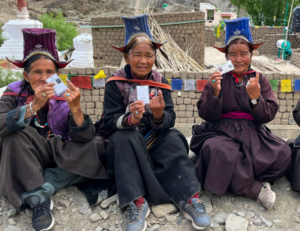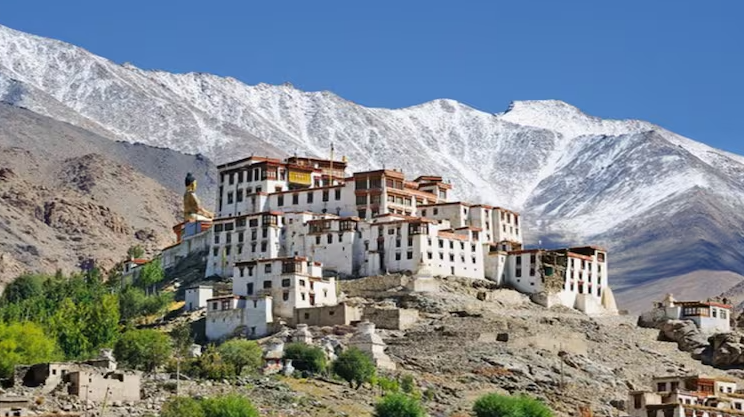By Pravin Kumar
The Union Ministry of Home Affairs (MHA) has introduced sweeping new policies for the Union Territory of Ladakh, reserving 85% of government jobs for locals and mandating one-third of seats in the Ladakh Autonomous Hill Development Councils (LAHDC) for women.
These measures, effective immediately, aim to address long-standing demands for constitutional safeguards to protect Ladakh’s unique culture, language, and land following the abrogation of Article 370 in 2019, which stripped the region of its special status as part of the erstwhile state of Jammu and Kashmir.
New Domicile and Reservation Policies
Under the newly notified rules, a person qualifies as a domicile of Ladakh if they have resided in the Union Territory for at least 15 years, beginning in 2019, or have studied in Ladakh for seven years and appeared for their Class 10th or 12th examinations in a local educational institution. Additionally, children of Central government officials, All India Services officers, and employees of public sector undertakings, banks, statutory bodies, central universities, or recognized research institutes who have served in Ladakh for a cumulative period of 10 years are also eligible for domicile status. This domicile criterion determines eligibility for government jobs, with only 5% of gazetted posts open to non-domiciles, ensuring that 85% of these positions are reserved for locals in the general category and 10% for Economically Weaker Sections (EWS). Non-gazetted jobs are exclusively reserved for those holding a Ladakh Resident Certificate.
The reservation for EWS remains at 10%, while 80% of vacancies are allocated for Scheduled Tribes (ST), reflecting Ladakh’s predominantly tribal population (approximately 90%), which includes communities such as Balti, Beda, Bot, Brokpa, Changpa, and Purigpa. An additional 4% of jobs are reserved for residents along the Line of Actual Control/Line of Control, and 1% for Scheduled Castes. These measures aim to address local fears of job losses to outsiders, a concern heightened since Ladakh’s transition to a Union Territory without a legislature in 2019.
Women’s Representation in Hill Councils
The amendments to the Ladakh Autonomous Hill Development Councils Act, 1997, mandate that at least one-third of the seats in the LAHDCs of Leh and Kargil be reserved for women. These seats will be allocated by rotation across territorial constituencies, with the rotation schedule to be published in the official gazette. This move strengthens women’s representation in local governance, addressing demands for inclusive development in the region.

Background: Post-Article 370 Protests
The abrogation of Article 370 on August 5, 2019, which revoked the special status of Jammu and Kashmir, transformed Ladakh into a Union Territory without a legislative assembly. While initially welcomed by some in Leh, the decision sparked widespread discontent across both Buddhist-majority Leh and Muslim-majority Kargil due to the loss of constitutional safeguards that previously protected land, jobs, and cultural identity under Article 35A. The absence of a legislature has left Ladakh under centralized bureaucratic control, fueling fears of demographic changes, land alienation, and environmental degradation from unchecked development and tourism.
Since 2020, Ladakh has witnessed multiple protests, shutdowns, and demonstrations led by the Leh Apex Body (LAB) and Kargil Democratic Alliance (KDA). These groups have consistently demanded statehood, inclusion in the Sixth Schedule of the Constitution for tribal autonomy, job reservations, and separate parliamentary seats for Leh and Kargil. The Sixth Schedule, which grants autonomous councils to tribal areas, is seen as critical for empowering local hill councils to regulate land, forests, and cultural matters, protecting Ladakh’s fragile ecosystem and tribal heritage.
Role of the High-Powered Committee and Sonam Wangchuk
In January 2023, the MHA formed a high-powered committee (HPC) chaired by Minister of State for Home Nityanand Rai to address these concerns. The committee’s mandate included protecting Ladakh’s culture, language, land, and employment while fostering inclusive development. Initial talks faltered in March 2024, prompting climate activist Sonam Wangchuk to undertake an indefinite hunger strike in Delhi in October 2024. Wangchuk, a prominent advocate for Ladakh’s cause, has highlighted the region’s ecological fragility and the need for safeguards against industrial overreach and land loss to outsiders. His protests, including a 21-day fast in March 2024, galvanized public support and pressured the MHA to resume dialogue.
Subsequent meetings on December 3, 2024, January 15, 2025, and May 27, 2025, between the HPC, LAB, and KDA led to significant breakthroughs. The MHA initially proposed a 95% job reservation for locals, which was later adjusted to 85% for STs and 10% for EWS, alongside the 15-year domicile rule. The agreement also included declaring Urdu and Bhoti as official languages and reviewing 22 pending laws to address local concerns.
Local Reactions and Future Demands
Sajjad Kargili of the KDA called the May 27, 2025, meeting a “big achievement,” noting that the domicile policy secures jobs for local youth. Cherring Dorjay Lakruk, president of the Ladakh Buddhist Association and co-convenor of LAB, echoed this sentiment, emphasizing that the 2019 baseline for domicile eligibility provides time to consolidate benefits for locals. However, both LAB and KDA continue to press for statehood and Sixth Schedule status, which were not discussed in the latest talks but remain core demands.
Thupstan Chhewang, former BJP MP and LAB chairman, highlighted the lack of a public service commission due to Ladakh’s status as a Union Territory without a legislature but expressed optimism about ongoing negotiations. Wangchuk, who has mobilized thousands through protests, emphasized the need for autonomy to protect Ladakh’s tribal identity and ecologically sensitive landscape, warning against unchecked industrial projects that threaten pastoral lands and wildlife.
Broader Implications
The new policies mark a significant step toward addressing Ladakh’s grievances, which have simmered since 2019.
The 85% job reservation and women’s quota in hill councils respond directly to local demands for economic and political empowerment. However, the absence of a legislature and Sixth Schedule protections continues to fuel calls for greater autonomy. With Ladakh’s strategic location near China and Pakistan, its cultural and environmental preservation is seen as vital for both local stability and national security.
The MHA’s commitment to drafting constitutional safeguards for Ladakh’s land and culture, alongside the recent agreements, has eased tensions, but the region’s leaders remain vigilant. The next HPC meeting, scheduled in a month, is expected to address unresolved issues like statehood and tribal status, which could shape Ladakh’s future governance and identity.














